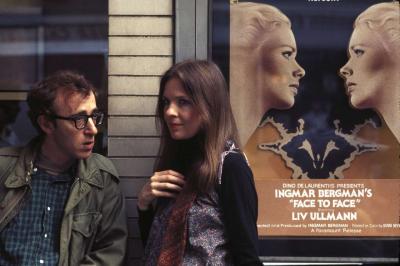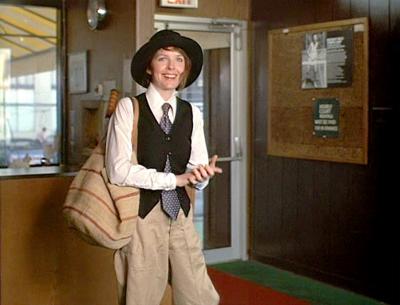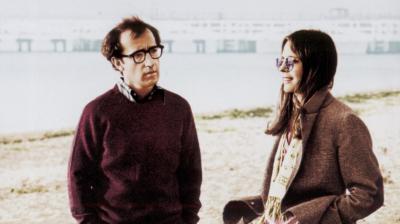Whenever I watch a particularly good Woody Allen movie, by the film’s conclusion I’m usually on the verge of tears. This isn’t to aver that his films are brutally melancholic. [1]Some have strains of that but it is always tempered with absurdist humor and a genuine charm.
I cry watching Woody Allen films because no filmmaker has had such a profound effect on my perception as both a human being and a cineaste. When I was younger, I used to watch movies with my family and I would either find them entertaining, or I would not find them entertaining. That was the spectrum of my tastes.
 Woody Allen changed all of that. I remember watching Annie Hall and Manhattan in tandem and thinking that not only were these the greatest films I’ve ever watched, these films depicted my concerns, they depicted the way that I felt (which, at the time, I couldn’t even articulate intelligibly,) and they depicted the way I wanted to be. It was from Woody Allen that my love of cinema was bred—it was from his allusions that I discovered the work of Ingmar Bergman and Federico Fellini — and all of that comes spuming to the surface after a Woody Allen viewing.
Woody Allen changed all of that. I remember watching Annie Hall and Manhattan in tandem and thinking that not only were these the greatest films I’ve ever watched, these films depicted my concerns, they depicted the way that I felt (which, at the time, I couldn’t even articulate intelligibly,) and they depicted the way I wanted to be. It was from Woody Allen that my love of cinema was bred—it was from his allusions that I discovered the work of Ingmar Bergman and Federico Fellini — and all of that comes spuming to the surface after a Woody Allen viewing.
So this week I decided to revisit my first exposure to Woody Allen: Annie Hall, the classic Woody Allen set-up where Woody—or in the film, Alvy—is a neurotic [2], self-deprecating funnyman who is a creature of New York. He falls in love with an innocent, if slightly naïve, girl named Annie Hall (Diane Keaton) who shares his penchant for art. The film meditatively documents their relationship, husbanding the farcical comedic aesthetic that Woody Allen is known for in order to propel the story forward.
 Diane Keaton’s presence in Woody’s films cannot be overstated. She is the consummate counterweight to Woody Allen. Woody’s persona is very pronounced. You don’t need to know that he was a comedian before he made films: You can feel him working a room even when he is having a private conversation with someone (and again, I’m a huge fan of his persona.) Diane Keaton displays a graceful naturalism that frees up the real estate for Woody to be his most eccentric self, without downplaying her own identity. She exhibits a similar sense of awkward nervousness, but it’s less clinical than Allen’s. Hers is more wholesome and upbeat.
Diane Keaton’s presence in Woody’s films cannot be overstated. She is the consummate counterweight to Woody Allen. Woody’s persona is very pronounced. You don’t need to know that he was a comedian before he made films: You can feel him working a room even when he is having a private conversation with someone (and again, I’m a huge fan of his persona.) Diane Keaton displays a graceful naturalism that frees up the real estate for Woody to be his most eccentric self, without downplaying her own identity. She exhibits a similar sense of awkward nervousness, but it’s less clinical than Allen’s. Hers is more wholesome and upbeat.
There are various scenes and one-liners that I have lifted from this film and enact in my life regularly. One scene in particular I have appropriated so frequently I should probably be paying Woody Allen royalties. It is where Christopher Walken delivers a solemn monologue about driving at night and having a primal impulse to veer into oncoming traffic. “I can anticipate the explosion,” he says, “the sound of shattering glass, the flames rising out of the flowing gasoline.” Many a time I have given this monologue to a nonplussed passenger who has called upon me to give them a lift. You’d think that my friends would seek transport elsewhere (or get around to watching Annie Hall) but alas they still pester me for rides.
 Watching this movie again was a gas, although I was somewhat surprised by my emotional response. When I watched this as a teenager, I remember feeling emotionally eviscerated over this ill-fated romance. I was young and had all of these grandiose notions about love and here I am—reflected in Woody Allen— winding up alone after everything that transpired, with all the accreted memories of clumsily squashing spiders for Annie Hall at 3:00 AM. It didn’t feel right that this is how things were supposed to resolve for me. I was ravaged.
Watching this movie again was a gas, although I was somewhat surprised by my emotional response. When I watched this as a teenager, I remember feeling emotionally eviscerated over this ill-fated romance. I was young and had all of these grandiose notions about love and here I am—reflected in Woody Allen— winding up alone after everything that transpired, with all the accreted memories of clumsily squashing spiders for Annie Hall at 3:00 AM. It didn’t feel right that this is how things were supposed to resolve for me. I was ravaged.
As I watch it now, I feel much like Alvy and Annie do as they mutually agree to break-up. [3] Things were getting kind of stagnate with Annie. I thought that introducing her to all of the things that I value would foster a greater bond between us and I suppose it did, but what eventually happened was that all of my worst qualities were transferred unto her. Moreover, she was blossoming into this freewheeling Californian that was categorically incompatible with my New York ethos.
No longer do I feel the great loss of love that I felt as a teenager. That was never the crux of the film anyhow. Even though things don’t work out, Woody Allen still celebrates Annie Hall and all of the ravishing memories that they shared, for they can never be effaced. So what if things didn’t work out? That can’t tarnish the image of that neat girl from Wisconsin. The emotional corollary that I’m left with now is the bitter awareness of my irrational need to be in love, and my Draper-esque inability to ever satisfy it.
But we have no regrets with Annie Hall. And we sure don’t regret re-watching this masterpiece.
[1] Unless we are speaking of that elusive state of Ozymandias Melancholia.
[2] He embodies neurosis to such a degree that he has become inseparable from the condition and the condition from him. I like to do this experiment in which whenever I observe someone use any form of the word “neurosis,” I immediately ask them what their first free association is with that term. The answer is invariably Woody Allen. The same relationship exists among David Bowie and androgyny.
[3] The other difference is that I actually comprehend most of his cultural references that salt his banter, which is gratifying on multiple levels.
